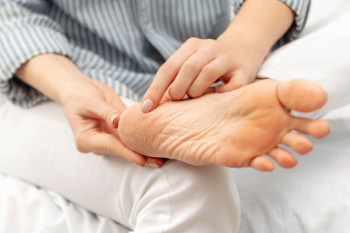
Cracked heels can be more than a cosmetic concern, they may signal underlying nutritional deficiencies. Vitamins play a vital role in maintaining healthy skin and preventing such issues. Vitamin A, essential for skin repair and cell turnover, helps prevent dryness and cracking. A vitamin deficiency can lead to rough, flaky skin on the feet. Vitamin E is known for its antioxidant properties and its ability to promote skin healing and hydration, so low levels can impair the skin's ability to recover from damage. Vitamin C is vital for collagen production, which supports skin elasticity and strength. Insufficient Vitamin C can result in weakened skin prone to cracks and splits. Ensuring a balanced diet rich in these vitamins can help maintain healthy, smooth heels and prevent cracks. Cracked heels can be unsightly, and sometimes painful if fissures develop. If you have troublesome cracked heels, it is suggested that you consult a podiatrist for treatment suggestions.
Cracked heels are unsightly and can cause further damage to your shoes and feet. If you have any concerns, contact one of our podiatrists from Podiatry Care Specialists. Our doctors can provide the care you need to keep you pain-free and on your feet.
Cracked Heels
Cracked heels appear unappealing and can make it harder for you walk around in sandals. Aside from looking unpleasant, cracked heels can also tear stockings, socks, and wear out your shoes. There are several methods to help restore a cracked heel and prevent further damage.
How Do You Get Them?
Dry skin is the number one culprit in creating cracked heels. Many athletes, walkers, joggers, and even swimmers suffer from cracked heels. Age and skin oil production play a role to getting cracked heels as well.
Promote Healing
Over the counter medicines can help, especially for those that need instant relief or who suffer from chronic dry feet.
Wear Socks – Wearing socks with medicated creams helps lock in moisture.
Moisturizers – Applying both day and night will help alleviate dryness which causes cracking.
Pumice Stones – These exfoliate and remove dead skin, which allows for smoother moisturizer application and better absorption into the skin.
Change in Diet
Eating healthy with a well-balanced diet will give the skin a fresh and radiant look. Your body responds to the kinds of food you ingest. Omega-3 fatty acids and zinc supplements can also revitalize skin tissue.
Most importantly, seek professional help if unsure how to proceed in treating cracked heels. A podiatrist will help you with any questions or information needed.
If you have any questions, please feel free to contact our offices located in West Chester, and Broomall, PA . We offer the newest diagnostic and treatment technologies for all your foot care needs.
